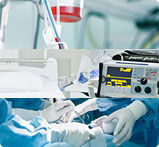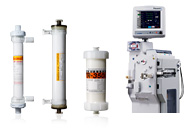Familial hypercholesterolemia (FH)
Familial hypercholesterolemia (FH) develops in individuals who inherit the gene for high cholesterol from one or both parents. Inheriting the gene from both parents leads to homozygous FH and inheriting it from one parent to heterozygous FH. In FH, LDL cholesterol levels are elevated, and typical symptoms include hypercholesterolemia; xanthoma in the skin, tendons, gluteal region, and between the fingers; and coronary arteriosclerosis that may lead to myocardial infarction.
FH is treated with dietary and drug therapies. In severe cases, plasma exchange and LDL apheresis (DFPP) are performed to remove lipids directly and selectively from patients' plasma.
Focal segmental glomerulosclerosis (FSGS)
In FSGS, focal sclerosing lesions occur in the renal glomeruli. Many patients exhibit symptoms referred to as "nephrotic syndrome," characterized by progressive loss of renal function and poor prognosis. In the nephrotic syndrome, generalized massive edema and albuminuria are observed in addition to hypoproteinemia and hyperlipidemia, including cholesterolemia. Pharmacotherapy is administered to FSGS patients. In case it is not effective, DFPP is performed to remove LDL cholesterol and causative factors such as IgM and complement.
Fulminant hepatitis
Fulminant hepatitis (FH) and acute hepatic failure exhibit symptoms of hepatic failure including hepatic encephalopathy due to severe liver dysfunction resulting from marked, widespread hepatocyte necrosis. These two critical, life-threatening conditions are still difficult to treat in emergency medicine.
Plasmapheresis and CRRT are performed for artificial liver support (ALS). ALS results in significant improvement in the patient's systemic condition including maintenance of consciousness. It is also effective as a bridge to liver transplantation.
Guillain-Barré syndrome (GBS)
Guillain-Barré syndrome (GBS) is a disease of the peripheral nervous system characterized by systemic weakness or tingling sensations. GBS is thought to result from an autoimmune response, either humoral or cell mediated, to a viral infection or long-term drug administration. Plasmapheresis and IVIg are used to treat GBS.
Hemophilia
Hemophilia is a hereditary hematologic disorder caused by a lack or abnormality of coagulation factors. In hemophilia patients, the blood does not easily coagulate, and therefore any bleeding continues. Hemophilia A results from the lack or abnormality of blood coagulation factor VIII, while hemophilia B results from the lack or abnormality of blood coagulation factor IX. When inhibitors of blood coagulation factors are present, PE is performed to reduce them.
Henoch-Schönlein purpura nephritis
Henoch-Schönlein purpura nephritis is a syndrome of allergic angiitis in microvessels in the skin, joints, digestive tract, and kidneys, mainly occurring in infants. Suspected causes include bacterial/viral infection and anaphylaxis. There is no established medical treatment, but steroids and immunosuppressants are administered. DFPP or PE is also performed alone or in combination with medication.
Hyperbilirubinemia
Hyperbilirubinemia is characterized by elevated plasma bilirubin concentrations due to hemolytic anemia, alcoholic hepatitis, calculi, etc. When the plasma bilirubin concentration becomes greater than 3.0 mg/dl, the patient exhibits jaundice.
Plasma adsorption (PA) or plasma exchange (PE) is performed to remove excessive bilirubin and bile acid from the blood.
Please feel free to send us any questions you may have about our products and support.
Share your feelings and experiences when using our products.





